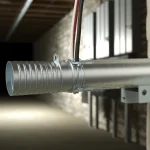Electrical conduits are essential components in any electrical wiring installation, providing a safe and protected pathway for electrical wires. They prevent damage from external factors and enhance the safety of electrical systems. This guide explores the various types of electrical conduits available, helping you choose the right one for your specific needs.
Understanding the Basics of Electrical Conduits
A tube protects and routes electrical wiring in buildings or structures, known as an electrical conduit. Typically, manufacturers craft it from metal or plastic, offering rigidity or flexibility. Each conduit type presents distinct advantages, tailored to specific applications considering factors such as durability and installation needs.
Types of Metallic Conduits

Rigid Metal Conduit (RMC)
RMC provides robust protection in industrial settings, shielding against damage with coated steel, aluminum, or stainless steel. Its metallic composition enables RMC to serve as a grounding conductor.
Intermediate Metal Conduit (IMC)
IMC is lighter than RMC but still offers significant protection. It is easier to handle and install, making it a cost-effective choice for protecting cables in commercial buildings.
Electrical Metallic Tubing (EMT)
EMT, often referred to as "thin-wall" conduit, is a lighter, more flexible option. It is commonly used in residential and light commercial construction for indoor applications. EMT is easy to cut, bend, and install, making it a popular choice for less demanding environments.
Types of Non-Metallic Conduits
PVC Conduit
PVC conduit is versatile and affordable, making it a popular choice for both indoor and outdoor applications. It is particularly effective in damp areas as it is resistant to moisture and corrosion. PVC is easy to cut and assemble, which simplifies the installation process.
Electrical Non-Metallic Tubing (ENT)
ENT is a flexible plastic conduit that can be easily bent and is used primarily inside walls, floors, and ceilings. It is flame-retardant and moisture-resistant, making it suitable for enclosed and exposed locations within residential buildings.
Specialty Conduits
Liquid-Tight Flexible Metal Conduit (LFMC)
LFMC is a flexible metal conduit that has a waterproof jacket, which makes it suitable for use in areas exposed to moisture.
Galvanized Rigid Conduit (GRC)
GRC is similar to RMC but has a galvanized finish, making it exceptionally resistant to corrosion. This type of conduit is often used in commercial and industrial applications where extreme conditions are present.
Choosing the Right Conduit
Selecting the right electrical conduit involves considering several factors:
- Environment: The location where the conduit will be installed plays a crucial role in determining the type of conduit needed. Outdoor, industrial, or moisture-prone areas typically require more robust conduits like RMC, GRC, or LFMC.
- Flexibility: If the installation requires routing around obstacles or in tight spaces, flexible conduits like ENT or LFMC might be necessary.
- Protection Needs: For areas where physical damage is a concern, thicker and more durable conduits like RMC or IMC are preferable.
- Cost: Budget constraints can also influence conduit selection. PVC and EMT are generally less expensive and easier to work with than metal conduits.
Installation Tips
Proper installation of electrical conduits is crucial for ensuring safety and functionality. Always adhere to the National Electrical Code (NEC) and local regulations. Use appropriate fittings, supports, and sealing products to secure and protect the wiring. Regular inspections and maintenance are also essential to address any issues promptly.
Wrapping Up
Electrical conduits play a vital role in the safety and efficiency of electrical installations. Understanding the different types of conduits and their applications allows for informed decisions, ensuring that electrical systems are both safe and functional. Whether you are working on a residential, commercial, or industrial project, choosing the right conduit is key to a successful installation.
Also see: Best Conduit Clip: Comprehensive Review of HellermannTyton 166-90180 HelaGuard

